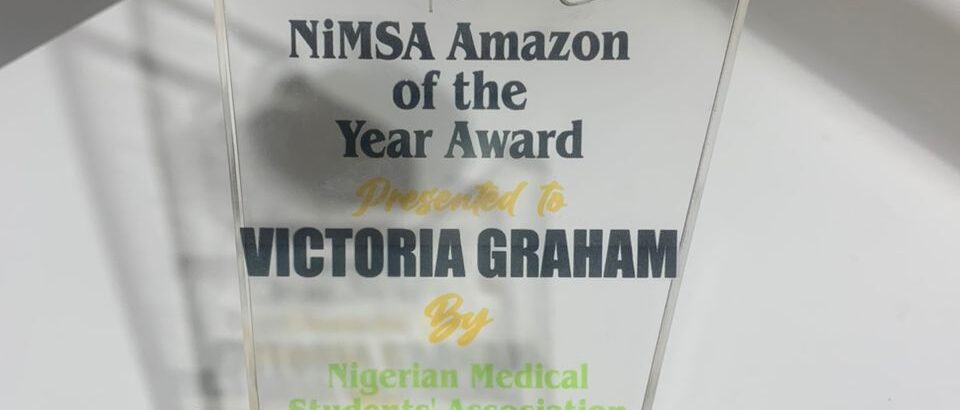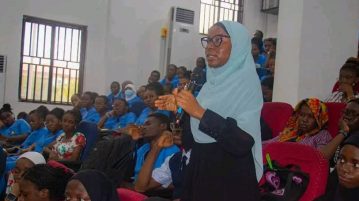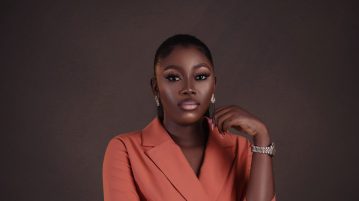In the recent 2010’s till date, only about an average of approximately 20% of the NiMSA executive council positions have been reportedly occupied by females, with even fewer vying for the highest position of presidency. Hence, we reached out to the most recent female presidential candidate for NiMSA – Victoria Nsikakabasi Graham (VNG) – who shared her leadership experiences and lessons from the 2023 NiMSA electoral process.
Fun fact: Over the past decade (2013 – 2023), here is a list of female presidential candidates NiMSA has had: Winifred Erepade Esite from Niger Delta University, Bayelsa State (contested in 2016), Ehi Ekoja from University of Jos (contested in 2022), Victoria Nsikakabasi Graham from University of Uyo (contested in 2023).
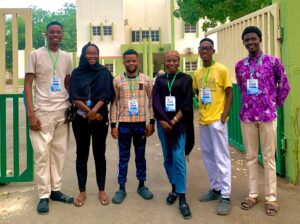
Q: Hi, Victoria. Can you tell us briefly about yourself?
VNG: My name is Victoria Nsikakabasi Graham, a final year medical student of the University of Uyo and the Public Relations Officer for the 2023 Skill’s-led administration of the Nigerian Medical Student Association (NIMSA). I hail from Akwa Ibom State, Mkpat Enin LGA to be precise.
Q: Nice to meet you. So, how did you develop your interest in leadership and what specific experiences or individuals influenced your decision to take up leadership positions?
VNG: I view leadership as a calling, and if you’re not called to it, you’d definitely struggle. You might love the position and the influence that comes with it, but if you don’t see it as a platform to be responsible to the people you serve, you begin to lose it, basically.
My interest in leadership was cultivated a long time ago. My mom is a church minister, and it was naturally expected that she would groom exemplary kids for others to look up to. So, my siblings and I were put on the spot at very young age. And unlike other Preachers’ kids who might have seen this has a “problem” or “being caged”, I saw things differently.
Having people look up to you means you have to live up to expectations. I had to start a confinement of attitude. I saw myself as a leader who had to be responsible, because my lifestyle affected how other people behaved. This mentality started from a very young age, and it instinctively pushed out leadership qualities in me.
Asides being a preacher’s kid which was significant enough to make me realize that I had leadership potentials, I’ll say being my mother’s daughter shaped me. Not only was my mom a minister in church, but she was also a teacher at the primary school I attended, for a while and she was a very strict disciplinarian. Even after she left, the best was expected of us. My sister as well didn’t make things easier, as she was always a role model first position student at school, and I had to beat that record.
And then there were individuals like my teachers at each stage of my life who invested so much trust in me, from primary school up till date. There are also other notable individuals who inspire me from afar. The likes of Dora Akunyili of blessed memory, she was a force, and I admired her a lot. Also, Obiageli Ezekwesili, Ibukun Awosika, I love these women. Then, top on the list is Ngozi Okonjo-Iweala. She’s my all-time icon, my all-time role model. I look at her because she’s someone I want to be like—a woman at the top of her field, an African woman who promotes the African culture. A married woman, mother, grandmother with no scandal attached to her personality. A woman recognized by kings. Watching her from afar has shaped me.
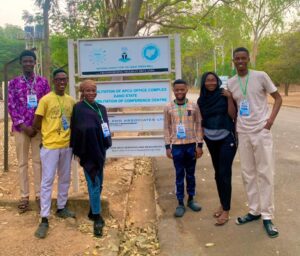
Q: Can you share details about your initial leadership roles, before your involvement in NiMSA?
VNG: Really, I have been involved in taking care of people from a young age. In primary school and junior secondary school, I served as the assistant head girl – which entailed being a role model to your colleagues, giving speeches, dressing well etc – and in senior secondary school, I took on the role of assistant class prefect.
Likewise in church, I served as the teens’ leader for the parish and later as the teens general secretary at the area level. This gave me my first exposure to coordinating and organising. Later, I was elected the teens vice president for the entire province and had to represent the province at National programs, while coordinating teenagers from my church at these programs.
Upon entering the university, particularly in my second year, I started participating in different activities by groups and associations. I vividly recall our class outreach organized by the Christian Medical and Dental Association (CMDA) to an orphanage home. Despite not being one of the executives, I instinctively wanted to know what the plans were. This made my colleagues think I was one of the planners and set the stage for my leadership journey in the university. I later went on to become class missions secretary, then assistant school mission secretary and school correspondence secretary (liaison officer between the doctor’s arm and the student’s arm).
Outside CMDA, I also served as the programs director for Hult Prize Ng, one of the coordinators for MedSynapse Ng, State Coordinator for Food Meets Naija – where we fed 200 kids and gave them welfare materials such as clothes, shoes, bags etc – and project coordinator for Health Compass Initiative (a nongovernmental organised focused on tackling Non-Communicable Diseases).
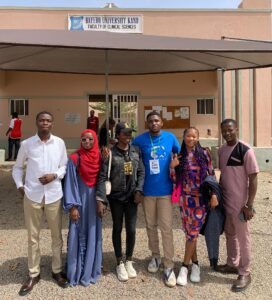
Q: What were the challenges you faced early on and how did they affect your leadership style?VNG: The truth is, I’m naturally a very shy person. It might be hard to believe, and I’m sure many wouldn’t think that about me. Public speaking and addressing a large crowd have always been significant phobias for me. At first, I covered up my shyness with a superiority complex, convincing myself that I was the best and better than others. I realized later that it was just a way of camouflaging, boosting my confidence to execute my duties. I had to address the real issue—my self-confidence and self-esteem. I had to truly believe, deep down, that I wasn’t in competition with anybody and stop comparing myself with other people.
Another massive challenge I had was that I could not handle my emotions; anger, sadness. I remember an incident that occurred as the teens leader with this girl I had been avoiding because she was too much. However, we had an upcoming event that required rehearsing together and on this fateful day, I was not going to take any rubbish. I asked her to do something, and she acted in her usual manner. So, we went physically combative. After this event, it occurred to me that leadership exposes your flaws because if I was not the teens leader at the time, I would not have had to coordinate the rehearsal, and she would not have had an avenue to talk to me or trigger me.
So, if you must be a leader, you must expand your “crap-absorbing” ability. I had to do a whole lot of attitude adjustment because I knew I would not go far with temper issues, a superiority complex, or low self-esteem.
During this self-evaluation and giving myself the credit I needed, I discovered I didn’t have to fake anything or put on a show. I was good enough, and I was who God said I was. I didn’t have to look down on anyone to feel good about myself. I understood respect, love and sacrifice were part of leadership. Plus, I can’t take credit for all this transformation without acknowledging the place of God and the Holy Spirit in teaching me what to do, how to do it, and guiding me to meet important people with like minds who played a significant role in shaping me into a better leader.
Q: What motivated you to join and become politically involved in NiMSA?
VNG: In my second or third year, my school’s medical students’ association (MSA) president added me to a platform related to the Standing Committee on Medical Education (SCOME), a sub-arm of NiMSA. He then added me to the Standing Committee on Policy Implementation (SCOPI) and told me I was the liaison officer.
Being very inquisitive, I reached out to my director, but that particular administration wasn’t very active. Despite this, I remained inquisitive, continually asking questions about the association. Then I heard of a senior colleague in my school, Dr. John Ebong, who was an official in NiMSA at the time. He was very active and would travel frequently to other countries for different programs. So, I approached him to explain NiMSA and its workings to me.
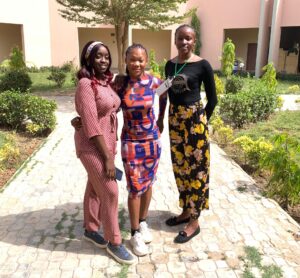
He was very eager to share his knowledge and advantages of being active in NiMSA. Because he could see the low representation of our school in the association, and he wanted to mentor junior colleagues. Even though, at the time, I didn’t understand the whole concept and was not outrightly interested in being active in the association, I learnt under his mentorship, followed his instructions and the rest – they say – is history.
So, in 2018 I served as a member in SCOME and Local Officer for SCOPI. In 2019, I became a National Representative for Standing Committee on Medical Outreaches and Local Officer for MWAN. In 2020, I was Regional Assistant on Projects and Programs, and Chairperson for the Task Committee on COVID-19. In 2021, I served as the National Public Relations Officer for the Standing Committee on Capacity Building (SCOCB) and Chairperson for the SCOCB Award Committee. By 2022, I became the Technical Officer for Capital Projects and Mobilization, and in 2023, I was the National Public Relations Officer for NiMSA.
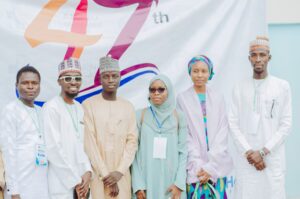
Q: Were there particular goals or visions you had when entering into NiMSA leadership roles?
VNG: To be very honest, I never really had a goal at the beginning. I just wanted to know what it was like and see the advantages attached as mentioned by my senior colleague. Basically, just flow with the ride, go for conferences, meet people and get trainings in relevant field. Also, I love traveling, so I enjoyed the opportunity to meet people from different universities, and that was it for me at the very beginning.
Q: Could you highlight some significant moments or projects during your leadership journey in NiMSA that had a lasting impact?
VNG: One of the most defining moments for me, occurred in 2020 when Dr. Ebong reached out to me. He acknowledged my capacity while handling past responsibilities in CMDA and our MSA, and how four past MSA Presidents (namely; Dr. Godspower Essien, Dr. Edem Clement, Dr. Udoeden Emmanuel and Dr. Ntuen Talent) have also noticed this, making them conclude to mentor me for leadership roles in NiMSA. Especially preparing me towards representing the University of Uyo Medical Students’ Association (UUMSA) in three years’ time, when the NiMSA presidency rotated back to our region. This singular interaction left a profound impact and reinforced the trust and faith other people – who have gone ahead – had in my leadership capabilities. However, around the same time, another colleague also expressed his interest in running for the president position in 2023 with me. So, to avoid a conflict-of-interest, I informed Dr. Ebong. In the end, interest aligned, and this colleague stood by me all the way.
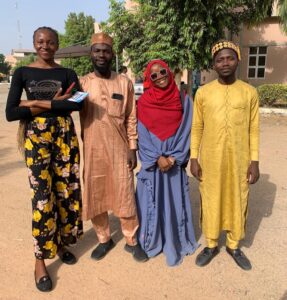
On the other hand, a project that stands out for me was in 2019 when Dr. Wunmi Ajayi (popularly known as Dr Sniper) was Vice President Internal and initiated the Standing Committee on Medical Outreach (SCOMO). This involved coordinating medical students for an outreach in secondary school. I was in my third year then but had to lead colleagues from first to fifth year, deal with challenges such as fundraising, and convincing volunteers to contribute their skills without payment.
Coordinating not only junior but also senior colleagues exposed me to the complexities of leadership. Despite the difficulties associated with this, it was a valuable experience. Emphasizing my ability to handle diverse groups and navigate challenges effectively.
Q: Exactly how did you navigate challenges and celebrate achievements within the organization, especially as a lady in a male dominated association?
VNG: I approach challenges and celebrate achievements within the organization without considering gender as a factor. I focus on doing my best in all ramifications, executing projects, and putting myself out there. Gender should never be a consideration as long as you’re getting the job done. Sadly, I don’t think things are perceived that way in NiMSA. It’s been over 47 years, and we still do not have a female president.
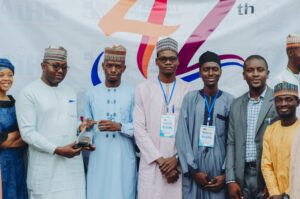
Being a female leader in a male-dominated association has never been a hindrance until last year when I aspired for the apex role. In 2020, as the chairperson for the COVID-19 task force in the South-South region, I led a team consisting solely of males, some of which subsequently became presidents of their MSAs. Despite being the only female, we successfully executed the project and raising awareness about the COVID-19 pandemic through the Twitter platform.
Earlier in my leadership journey, I mentioned facing challenges with emotions. I made a conscious effort to respect everyone, recognizing that men and women lead differently and aren’t in a competition. Personally, I lead with a feminine touch, acknowledging the distinct strengths of both genders.
In overcoming initial challenges, I’ve accomplished remarkable things within NiMSA, showcasing that effective leadership transcends gender dynamics. The key is knowing how to lead, getting the job done, and earning respect. I am particularly proud of myself that there was no scandal surrounding my presidential candidacy (on a lighter note, I’m sure Okonjo-Iweala would be proud of me too). This is because I fought like a man, so at a point, I heard things like “you don turn man already”.
I was not going to allow anyone to take advantage of my gender to make unnecessary advances. I set boundaries and gave them optimal respect, but I respected myself as well. I was determined that the myth of women using their body to get to places of authority would not be my story.
Q: That must have been an experience! In what ways would you say your leadership roles in NiMSA has contributed to your personal and professional development?
VNG: Being involved in NiMSA has been life-changing for me. I’ve acquired valuable skills such as public speaking, time management, multitasking, effective communication and interaction with people. I’ve developed the ability to build friendships and relationships easily. NiMSA brought out hidden talents I never knew I possessed. Particularly during this last election, amidst significant writing my Part 3 professional exams, I contested for the position of NiMSA President, actively multitasking and demonstrating my ability to balance responsibilities. Overall, NiMSA has been an incredible journey, contributing significantly to my personal and professional development.
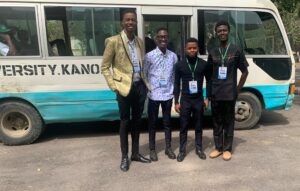
Q: How do you foster collaboration and teamwork within your teams or organization?
VNG: Fostering collaboration and teamwork within a team requires respect – it’s key. Everyone wants to feel respected and included. They want to understand what’s happening with the project at hand. In my role as the coordinator for SCOMO in 2019, when we did a secondary school awareness campaign, I ensured that everyone involved was well-informed. I took the time to communicate with session leaders and reach out to my president, making sure everyone felt as a part of the process.
Also in 2020, when I served as the chairperson for the NiMSA South-South Tax Committee on COVID-19, maintaining communication was important. I continued to keep everyone in the loop, checking in with team members when energy levels dropped. Regular communication and transparency were key aspects of maintaining a cohesive team. Even when dealing with sponsors, I maintained transparency by sending detailed emails and keeping everyone informed.
Lest I forget, don’t take decisions on your own. Ask for their opinions; let them give you suggestions. As a team lead, you may think you have everything under control, but when you are open enough to hear from them and know what they think, you’ll be amazed at the suggestions that your mind wasn’t open to in the first place.
This inclusive approach of carrying everybody along allows team members to feel respected and engaged, ensuring they can confidently contribute when asked. Summarily, this is the fundamental approach to fostering collaborations and teamwork.
Q: Can you share an example of a successful collaborative effort that stands out in your leadership journey?
VNG: Back in 2020, I recall one of our initiatives aimed at addressing the rising mental health challenges brought about by the pandemic. We collaborated with a mental health NGO to provide free counseling sessions for individuals experiencing mental health issues during that period. Many were dealing with breakdowns, anxieties, depression, and more. The counsellors offered their services to those who indicated interest. It was a significant collaboration, and we were pleased to work with Mental Health Empowerment Initiative.
Another outstanding partnership was secured in 2022. We won an international grant from an NGO, sponsoring a mental health project and we intend to implement capital projects in two medical schools in the Northern region. The grant at the time was an equivalent of about #500,000, but we effectively managed the funds and extended the project to cover two regions, surpassing the initial plan for just one.
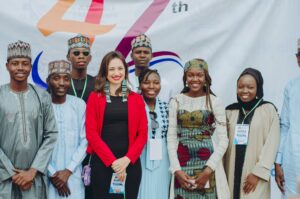
Q: So, you contested for the apex position in NiMSA alongside writing your part III Professional examination, how did you balance the demands of academics with your leadership responsibilities?
VNG: Balancing politics and academics was quite challenging. A few weeks before the election, which coincided with my Part Three MBBS exams in Paediatrics and O&G, I reached out to the regional coordinator for the Southwest region, Dr. Aisha Abdulmojeed, whom I greatly respect. She had recently passed her final exams and successfully coordinated the regional convention. I sought advice on how she managed to balance both responsibilities and she shared her approach strategies.
However, given the high stakes of what was at hand — contesting the NiMSA Presidency was a project I have nurtured since 2020 — and haven understudied different administrations, consulted far and wide, and seen the utmost need to excel academically; I had to find effective personalised ways to manage both aspects of my life.
There were days when I would return to Uyo from my travels late at night and go straight to the hospital for night class despite the stressful trip. I had to strategize, picking weekends during O&G postings to travel (paediatrics was too voluminous, so I travelled only once or twice during paediatrics posting). Knowing fully well that my colleagues would have done a lot while I was away, whenever I returned from my trips, I would stay back at the hospital after school till the next morning for days to get bedside teaching, observe procedures, and to cover up generally. I had no business with my bed for weeks, maybe except to take a nap. I remember my school bag contained all the essentials; school book, lamp, extension, toothpaste, soap dish, wrapper.
God was a constant factor because I did not know how I stayed sane and could laugh and interact with people normally at the time. I was under a lot of pressure, but His word gave me all the assurance I needed. Then, I thank God for the gift of friends. They would check on me, leave written notes, bring food, offer to wash my clothes, and iron them. There was one friend – Ugochinyere – who said, “Victoria, every David needs a Jonathan, and I will be your Jonathan”. She came with me for most of my trips, and despite the fact that we had exams, she came to Kano for the GA, and I’m happy we both passed that exam.
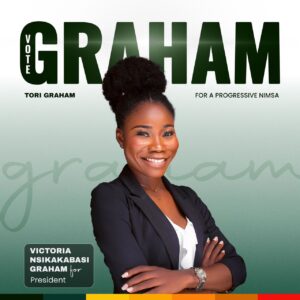
Q: What is your vision for the future of NiMSA, and how do you hope your leadership will contribute to its ongoing success?
VNG: I anticipate a NiMSA where doctors refrain from involvement in student politics permanently. How can a “doctor” consistently be in the forefront year after year, not merely in an advisory capacity but actively seeking to determine the outcome each year? The desire to dictate appointments and control outcomes is demeaning. It gives off a godfatherism vibe, which is not totally bad in itself, if they were not paying so much attention to the “god” aspect, more than the “father” aspect.
I look forward to a NiMSA where we pay more attention to capacity building, taking the association to great, limitless heights. I envision a place where we give a platform to people who are qualified and can get the job done, instead of merely appointing dormant individuals – as political rewards – who lack leadership skills and have no interest in seeing the association progress.
I also look forward to a NiMSA where a woman boldly aspires to the apex position without the fear of being sabotage, solely because of her gender.
Above all, I look forward to a NiMSA where female leaders genuinely support and uplift each other. There is a prevalent facade where women intentionally undermine one another. I encountered significant resistance from fellow women, not due to any harm I caused them, but rooted in deep-seated jealousy and envy. Some were indifferent, with one explicitly stating her disinterest, prioritizing her own aspirations. Shockingly, these are individuals holding positions meant to support the role and impact of women in society. The irony is disconcerting.
I’m in my final year and I would not be actively involved in NiMSA as I have other personal project to handle but I’ll be mentoring more females to find their niche in the system, maximize their potential and harness all the opportunities that comes with being a NiMSAite. As for me, it’s time to apply all the knowledge I have acquired in NiMSA in other life projects.
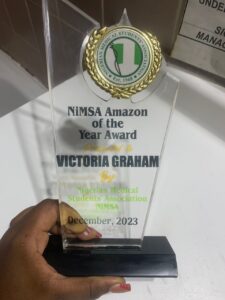
Q: Any word to a female medical student out there?
VNG: Although I experienced challenges with some women working against my candidacy, but they were the insignificant few. And it would be dishonest to deny the overwhelming support I received from incredible women in the system. One person who particularly stands out is Torobong Obot, an amazing colleague who also aspired to lead the association one day. Initially, it was quite intense because we came from different political factions internally, and she had also done well over the years. However, it was agreed that only one person could stand for the election from the school.
Not everyone has the maturity to forfeit their dream for the common good, but Toro did. She set aside our political differences and supported me wholeheartedly. We went to the Kano GA in oneness with the aim to win, although we did not win in the end, her selfless act proved that women can indeed make sacrifices for each other. Despite the efforts of overly opinionated individuals trying to sabotage my candidacy through her, she changed the narrative. Toro demonstrated that unity and support transcend political differences and propaganda. Together, we conducted a detailed analysis, negotiated, and she decided to step back, allowing me to be the sole candidate from my MSA. This speaks volumes about the strength and solidarity women should share despite their differences.
There were many other amazing individuals so passionate about my candidacy that, at one point, winning was not about me but about those who believed in me and did not fail to give a daily reminder. All my campaign fliers (by Feranmi Osayomi), photoshoots (by Ifiok Johnson), and makeup sessions by (Faith Edeke) were free as a form of support to the cause.

To the female medic in leadership, know that you are more powerful than you realize. Your existence is a plus to humanity. You are not in competition with anyone. Learn to love yourself and forgive quickly. They will perceive you as you perceive yourself, so treat yourself with the respect you expect from others ~ Victoria Nsikakabasi Graham.
Fun fact: And for every time a female contested the position of NiMSA president, we can say the outcomes of the elections got better and as females, we might be getting closer to the goal post. I.e. During Winifred’s contested election in 2016, the election became chaotic, and result was inconclusive. A rerun had to be done which declared Williams Nwekpa president for the 2017 tenure. During Ehi’s time about 6 years later, she only had one vote from over 40 MSA’s voting. Despite being a sitting president of her home MSA, she lost the election to an opponent from the same MSA – Jos University Medical Student Association (JUMSA). But by Victoria’s contested election late last year, she had almost half of the entire votes casted, losing to the winner with just 9 votes, while beating other male opponents in the race. This gives hope, that female participation within the NiMSA political space is progressing, and sooner than later, we might just have our first female NiMSA president.
Editor’s note:
This indepth interview and analysis article was conducted by Medical Mirror Correspondent, Dr Mary O. Agoyi Awoniyi.

